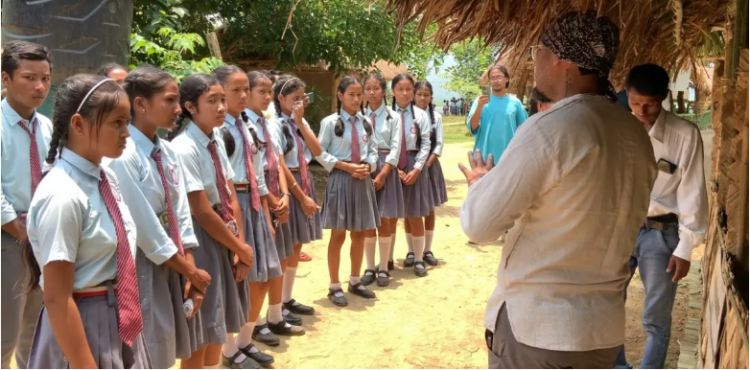On June 5, we celebrated World Environment Day, let us take through one of the positive news we heard this environment day. This village in Assam, Jaramkhuria located near the Chandubi Lake is being converted to zero-waste land by the Indian tourism department in collaboration with Nature’s Orbit Collective Foundation and Chandubi Jungle Camp.
With the idea of the zero-waste village the reformers brought in four banks to collect and segregate all the waste. It is plastic bank, paper bank, metal bank, and glass bank at the users end.
Speaking with media, Debabrata Rajkumar, founder of Nature’s Orbit said, “We have created a zero waste hub initiative. We have created a small waste resource centre where there are four banks: plastic bank, paper bank, metal bank, and glass bank. We also have an organic pit and a compost pit. That is what our initiative is all about: how to go zero waste, and how to minimize consumption.”
This is a small village in the lap of nature and unlike the metro and big cities there are no plants or bins installed in place to segregate the waste at the users end.
Notably, A Not For Profit Company, Nature’s Orbit Collective Foundation also plans to install segregation bins with proper IEC (Information, Education and Communication) activities to create awareness and make people conscious about their consumption.
“We are going to install segregation bins with proper IEC (Information, Education and Communication) activities to create awareness and make people conscious about their consumption. The idea is to promote responsible tourism with zero waste and promote the crafts and handlooms of the locals and also their culture of living in harmony with nature,” said the official.
It further added, “This World Environment Day, let us pledge to take concrete actions to restore and protect our ecosystems. Whether it’s reducing our ecological footprint, planting trees, or supporting conservation efforts, every little bit counts. Together, we can make a difference and ensure a sustainable future for ourselves and for the planet.”


On the occasion of World Environment Day, several activities – yoga, a screening of the documentary ‘Footprints’, and a walk through the woods of Loharghat – were organized to sensitise people about the environment.
Handloom expert Abhijit Das, who was also a part of the activites, said while speaking to a local outlet, “There are many artisans here who work with bamboo. We are trying to identify the art, and how we can uplift them, and provide them with access to a market where they can sell their wares. Since we use a lot of plastics nowadays, people should find handcrafted items available in their communities, cities, and states. Perhaps, people can replace the plastics with these handcrafted items,” he said.
Niloy Jyoti Talukdar, a member of the Guwahati Art Club and avid photographer, was part of a forest walk that was held on June 4.
“I was glad to be a part of the forest walk that commenced at 5:30 in the morning. We discussed how we can portray the environment through responsible photography. We held discussions on several topics, and we all came to a consensus on one thing: that for every beautiful scenery we shoot, we will also snap a photograph showing garbage, plastics, and pollution,”
The inauguration ceremony of the Zero Waste Resource Centre by Deputy Commisioner, Kamrup (R) and Regional Director, Indian Tourism, Guwahati will be followed by a discussion on ‘Plan of Action to promote Responsible Tourism addressing Climate Change’.
This is not the only village in the country to gain the ‘Zero Waste’ tag, there are two more to the list.
The Padupanambur village in Dakshina Kannada district was adopted by Ramkrishna Mission in 2019 to make it a zero waste village. In relation to this, Ramakrishna Mission Swacchata Abhiyan coordinator Swami Ekagamyanandaji told media that, “Under the new concept of zero-waste village, no waste from the gram panchayat should go to dump yards. Instead, waste should be reused scientifically.”
In April of 2023, Mannivakkam – a small village in Chengalpattu district of Tamil Nadu also achieved zero waste tag through a well-oiled garbage collection and segregation system.


















Comments